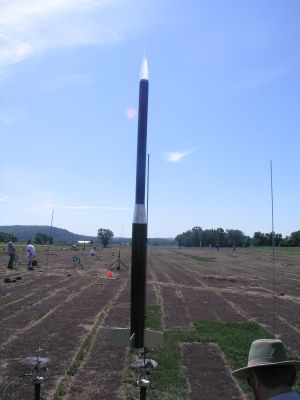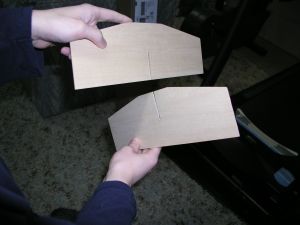| Construction Rating: | starstarstarstarstar_border |
| Flight Rating: | starstarstarstarstar |
| Overall Rating: | starstarstarstarstar_border |
| Manufacturer: | Rocket in a Box  |

Brief:
Rocket in a Box has a unique concept. They indicate that most rockets sustain more damage transporting the rocket to
and from the field than actually flying the rocket. Of course, this has to exclude any rocket eating trees! Their
rockets have a 3" tube that then transitions to a 2" tube half way up. You separate the rocket and slide the
2" section into the 3" section. But what about the fins? These are removable to allow packing into the box.
The Viper 28 is over 5' tall and is powered by dual E9 motors. The company offers to sell spare fins, nose cones, and for a fee, will actually build the rocket for you! But that just ruins the fun for us.
Construction:
The kit includes the following components:
- 3" body tube with fin slots
- 2" body tube
- 2 24mm motor tubes
- a 3" section of slotted tube to make a transition section
- a unique clear plastic nose cone
- a clear plastic 2" to 3" transition piece
- a short 2" tube insert
- a plywood and a basswood centering ring
- basswood fins
- plywood bulkhead
- Kevlar® cord
- shock cord
- 45" nylon parachute
- dowel
- rubber band
- launch lug
- decals
- nails
- glue stick
 The parts came well packed in a box that is a little over 3' long.
The parts came well packed in a box that is a little over 3' long. The instructions are about 9 pages long with various pictures to help show the construction steps. The instructions are clear and well organized. First the 2" tube insert is glued into one end of the 2" tube. This will be used to secure the nose cone. The transition section requires you to build the coupler portion. They provide a section of the 3" tube with a pre-cut slit along the length. You need to glue this slit together to make the smaller diameter tube to slide into the 3" tube. Apply the glue and tape the tube together. Allow this to dry overnight. I found I needed to do a little sanding of the joint so it would slide properly into the 3" tube. You then glue the plywood bulkhead to the this coupler tube. There is then a second, 2" plywood disk that glued to the first disk. And finally a short dowel is glued to the center. After this is dry, the 2" disk is glued into the bottom of the 2" tube. You then have to drill four 1/16" holes through the tube into the disk. Small nails are used to reinforce this joint. While the instructions calls out for only white glue, which is what I did, you could probably use epoxy and skip the nails. The plastic transition piece is then slid down over the coupling tube. You fillet the top and bottom with white glue to hold this plastic piece in place. You need to handle the plastic piece carefully or it will crack (as was the case with mine), however, the crack was small and did not affect the transition.
The fins are two pieces with a slot halfway through, one from the top and the other from the bottom. This then allows you to slide the 2 fins together to create an X shape. Support the 2 engine tubes with some wood blocks covered with wax paper and place the X part of the fins between the tubes. Slide the plywood engine mounting ring (the thicker one) over the tubes to 4 3/4". Apply glue around the top of the tubes to secure them to the ring. There is a hole in the engine ring to insert the Kevlar® cord through this hole from the top and tie a knot 1" from the end. Turn the tubes and fins over and apply glue to again secure the tubes to the ring. You also glue the Kevlar® cord to the ring. Be careful not to glue the fins to the ring or to get glue on the ring where the fins sit! Let all this dry. Test fit the ring/motor tube/fin section into the 3" tube. The fins will just slide up the slots. Check the bottom engine ring will slide onto the tubes and fit inside the 3" tube. Push this assembly back out. Slip the Kevlar® cord back through one of the motor tubes to keep it out of the way. Then using the supplied glue stick, apply glue inside the 3" tube, put a large bead of glue around the top edge of the engine ring. Insert the ring with the fins going into the fin slots--these help position the ring to the correct depth. Slide the bottom ring on (DO NOT GLUE) and use the rubber band around the outside of the 3" tube against the bottom of the fins to keep the motor mount and fins in the correct position. They suggest swirling the tube around to spread the large bead on the top. Again, drill 4 holes and insert nails to stiffen the top engine ring mount to the tube. You can stiffen the bottom of the tube with glue or CA (remove the bottom ring & fins first please).
Now, how do the fins stay in for flight? You put the fins back in along with the bottom ring. You'll need to make 2 marks 180 degrees apart and in a line to pass between the motor tubes. Drill two 1/4" holes. A dowel will pass through these holes to secure the bottom ring and fins. The supplied rubber band will wrap around the outside of the 3" tube to hold the dowel in.
Make a line along the length of the 3" tube between 2 fin slots. There are 2 spacers that you glue on this line and then you glue the launch lugs to the spacers. The spacers are needed to allow space for the rubber band.
The rocket comes with a nice 45" nylon parachute. Take the chute lines and loop them through a small supplied ring, then pass the chute through the loops. Tie the stretch cord to the ring a little over a foot from the one end. Tie this end to the screw eye. Drill a small pilot hole in the plywood disk of the transition section, insert a drop of glue, and screw in the screw eye. Tie the loose end of the stretch cord to the Kevlar® cord that was secured to the motor ring.
Lastly, there is another piece of cord. Glue this to the inside of the nose cone (at least 1" above the end) and the other end uses a standard Estes style tri-fold paper mount. Since the rocket separates at the transition, this cord and mount are just to help keep the nose cone from falling off and getting lost. It is not glued on since it needs to be removed to allow packing.
One item that is missing from the kit is any type of motor retention--not even a thrust ring. The instruction tell you to rely on a friction fit only.
Finishing:
The tube does not have spiral grooves. Instead, the way the tube is constructed there is an overlap of the material
causing a bump instead of a groove. I did not want to risk sanding this bump and wrecking the tube so I just decided to
leave it as is. The nose cone is unique in that it is a clear plastic. It almost looks like one of those cheap plastic
fluted champagne glasses with the bottom base removed. I decided not to paint the nose cone thinking I could install
some LEDs later. I did some light sanding on the fins and primed it with Krylon. I decided to paint the fins and
transition silver, the 3" tube black, and the 2" tube blue. Being a basic 4FNC rocket, the painting was very
simple. It did come with a decal, but I decided not to use it.
Overall, the construction is fairly simple with a few special considerations to allow for the dissassembly and packing. I didn't give the kit a full 5 due to the lack of any motor retention or thrust ring.
Construction Rating: 4 out of 5
Flight and Recovery:
With the fins off and laid flat, the 2" tube slid into the 3" tube, and everything back into the original
shipping carton, off I go to the NEPRA launch site. I got there and the weather started to turn iffy, so I quickly
prepped the rocket. Make the fins into an X, slide in, slide on the bulkhead, dowel, and rubber band to secure that
end. Nose cone onto the 2", some wadding, and the parachute. Install the two E9-4 motors and Estes igniters and
off to the launch pad. Due to the cluster and the fact the rocket won't be stable if only one motor ignites, they
called for a heads up flight. Countdown and both motors ignite. It has a fairly slow take off but goes up nice and
straight. At apogee, the ejection charge goes off and the chute comes out. But one of the 8 leads to the chute came
undone. The rocket came down a bit fast but escaped unharmed. The weather then turn sour so I was unable to launch it
again.
My next launch was at NERRF 3. I double checked the chute ties remembering my first flight. Unfortunately, I lost the rubber band. I decided to secure the dowel into the tube with a couple of wraps of masking tape. As it launched, it weathercocked into the wind. The ejection charge went off and the rocket separated. The parachute hung up in the tube and did not come out. As the rocket fell, I kept hoping the parachute would pull out. It went down behind some trees so I don't know what happened. I went searching for it and finally find it about 25' up in a tree. Worse, the tree is on the edge of a river that is about 20' wide. The branch it was hung up on is right over the middle of the river! I borrowed a pole they had and tried to work from the bank, but the angle to reach out over the river made handling the pole very difficult. After a half hour of trying plus putting a strain on a bad back, I decided to give up. I figured even if I did knock it loose, it would just fall into the river and get ruined anyway. I plan to try some of their other kits to replace this one.
I ended up 0-for-2 on completely safe returns. I should have checked the chute for the ties for the first one, and while I don't know exactly what happened on the second flight, I will take the blame for the chute hanging up (maybe it was the way I packed it). The mixture of the Kevlar® and shock cord and the nose parachute, I will score the flight/recover as the 5.
Flight Rating: 5 out of 5
Summary:
The rocket has some interesting build techniques (I had never used nails at least before in a low power rocket).
Being over 5' tall it looks impressive and has a nice, slow launch. I would prefer some motor retention, at least a
thrust ring. And while the concept to disassemble is interesting, I have definitely lost or damaged many more rockets
when flying than when transporting.
Overall Rating: 4 out of 5
 |
 |
Flights
Sponsored Ads
 |
 |










